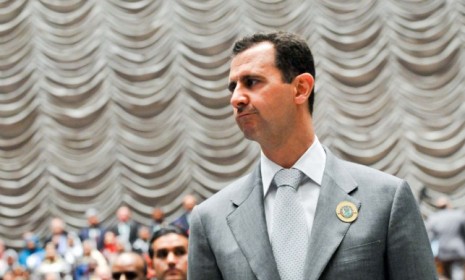The meaning of Syria's 'laughable' referendum: 4 theories
Assad says he's delivering on promises of reform. But critics say it's a cruel joke to hold a vote on a new constitution while the military is shelling civilians

A free daily email with the biggest news stories of the day – and the best features from TheWeek.com
You are now subscribed
Your newsletter sign-up was successful
As the Syrian military continued to blast civilian neighborhoods, the government of President Bashar al-Assad held a referendum on a new constitution Sunday. At least 59 civilians and soldiers were killed on the day of the vote, many of them in the besieged city of Homs. Assad said the referendum — which in theory would let him stay in power until 2028 — marked a step toward reform and the establishment of a multi-party system; according to state TV, it passed with 89 percent support. But the White House has called the idea of holding a vote on reform while the government is crushing the opposition "laughable." Here, four theories on what the vote really says about Syria:
1. Assad is just trying to fool his people and the world
Holding a constitutional vote while civilians are facing a "relentless, punitive bombardment" is nothing but a "nightmarish farce," says Britain's The Independent in an editorial. "Hardly anyone in Homs was in any position yesterday to tick or cross Mr Assad's meaningless shopping list of reforms." Besides, Assad has promised all of these things before — "fixed-term presidential mandates, multi-party elections, and other gewgaws" — so this is clearly just "another attempt to throw dust in the eyes of the international community."
The Week
Escape your echo chamber. Get the facts behind the news, plus analysis from multiple perspectives.

Sign up for The Week's Free Newsletters
From our morning news briefing to a weekly Good News Newsletter, get the best of The Week delivered directly to your inbox.
From our morning news briefing to a weekly Good News Newsletter, get the best of The Week delivered directly to your inbox.
2. Even if the reforms are real, Assad waited too long
A year ago, a constitution replacing the Baath party's monopoly on power with a multi-party system "would have seemed revolutionary," says BBC News. But now the opposition activists and organizations have "dismissed it as a sham." They boycotted the vote, saying paper reforms under Assad are meaningless, given how he has "ignored many elements of the old constitution, which guaranteed personal and political freedoms and banned torture."
3. Assad is throwing a bone to Russia and China
Assad's "belated carrots" don't have much credibility with the Syrian people, or the West, says The Economist. But that's not who the embattled leader wants to impress. The referendum is "designed to reassure Russia which, along with China, has twice wielded its veto at the U.N. Security Council to fend off censure of Syria." Assad wants to give Moscow cover as it says no to intervention, and insists on giving the Syrian government time to enact reforms.
A free daily email with the biggest news stories of the day – and the best features from TheWeek.com
4. This just proves Assad is in denial
"The referendum was the product of people who believe that nothing is wrong in their country," says Lebanon's The Daily Star in an editorial. Assad and his allies are living "in a state of denial," unable or unwilling to acknowledge "the protesters or the growing scope of the unrest." With the "appalling violence" continuing unchecked, Syria can't possibly "meet objective standards for a free vote." No foreign leader, or anyone in the opposition, will rethink their positions on Assad over this.
-
 Health insurance: Premiums soar as ACA subsidies end
Health insurance: Premiums soar as ACA subsidies endFeature 1.4 million people have dropped coverage
-
 Anthropic: AI triggers the ‘SaaSpocalypse’
Anthropic: AI triggers the ‘SaaSpocalypse’Feature A grim reaper for software services?
-
 NIH director Bhattacharya tapped as acting CDC head
NIH director Bhattacharya tapped as acting CDC headSpeed Read Jay Bhattacharya, a critic of the CDC’s Covid-19 response, will now lead the Centers for Disease Control and Prevention